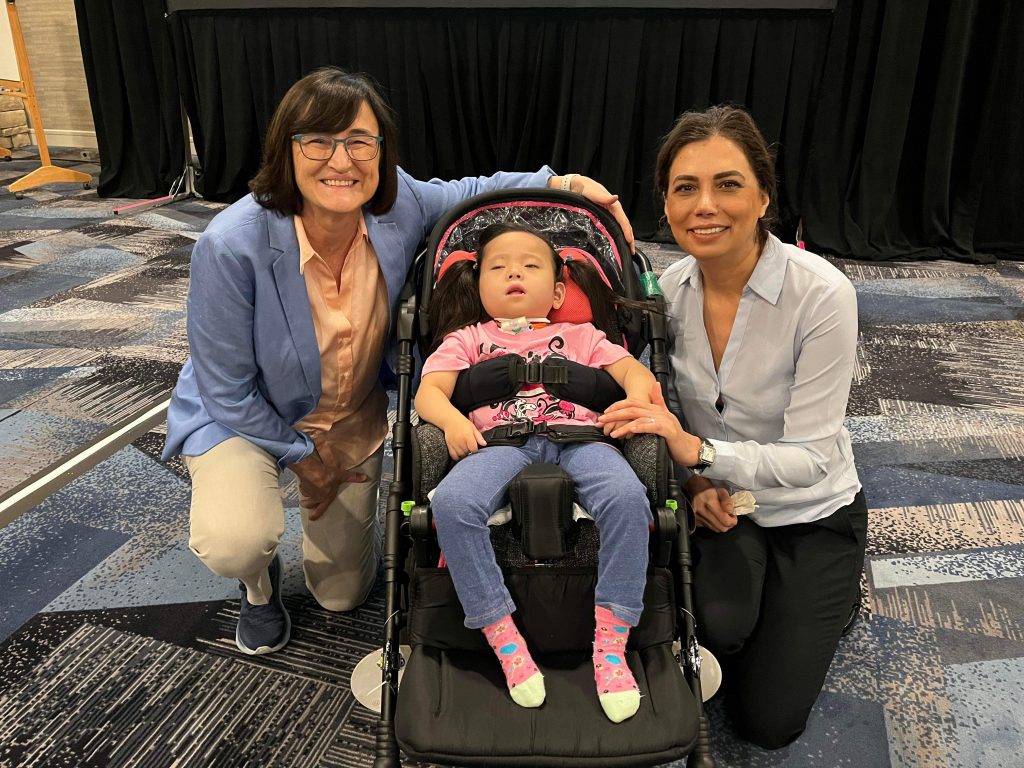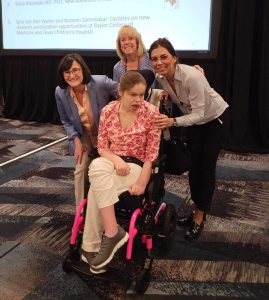





Baylor College of Medicine
Baylor College of Medicine
We have been looking for genetic changes that may be the cause of Aicardi syndrome using a new method, microarray-based comparative genomic hybridization (array-CGH).
This technique involves a DNA chip, the size of a microscope slide, with hundreds of thousands of small pieces of DNA attached to it. A DNA sample from a girl with Aicardi syndrome can be tested against the DNA on this chip. When a small piece of DNA in the tested sample is missing or has an extra copy, it will give a weaker or stronger signal on the DNA chip. By comparing the signals of DNA from many girls with Aicardi syndrome to those who do not, we may be able to find the critical region in the DNA that contains the Aicardi syndrome gene. Currently more than 20 DNA samples have been tested in our laboratory using this method and we are analyzing the results. We hope that this will point us to an area of DNA with a smaller number of genes that we then can study further to find the one that causes Aicardi syndrome.
In another ongoing laboratory project, we are performing a large study of X-chromosome inactivation on DNA samples of Aicardi syndrome girls to determine if there is skewed X-chromosome inactivation (XCI). Our current understanding of Aicardi syndrome suggests that the genetic change in people with this syndrome is located on the X chromosome. Whether skewed XCI is present in Aicardi syndrome has been a matter of some debate that we are trying to address with this larger study. Our results so far suggest that girls with Aicardi syndrome may have more skewing of XCI. The initial results of this work were presented at the 2006 annual meeting of the American Society of Human Genetics.
Another aspect of our research involves selecting good candidate genes on the X chromosome that we then test in detail in the DNA samples of girls with Aicardi syndrome. The decision to select a particular gene out of the ~1000 genes on the X chromosome is based on what we know about the function of the gene and how it compares to what we know about the medical problems in girls with this condition. Our ongoing work to analyze all the information of medical problems in Aicardi syndrome is an important component of our research. Participation of families is extremely helpful to our progress. We continue to enroll new families in our study and appreciate the medical records and information provided by participants in our study.
As part of this work, Dr. Bobbi Hopkins, one of our research team members, has performed a study on the brain imaging findings (MRI, CT-scan) in Aicardi syndrome that will be published soon. Tanya Eble and Dr. Richard Lewis are preparing a paper on the eye findings and Dr. V. Reid Sutton has published a paper on the facial and physical features of this syndrome. Drs. Sutton and Van den Veyver recently wrote a summary on Aicardi syndrome for Genereviews.org, and hope that this will generate an increased awareness among health care professionals, which will lead to faster and more accurate diagnoses for families. We also assisted in the writing of Ande Glasmacher’s paper, which reviewed features and treatment of Aicardi syndrome from collected family survey information. This paper is a great tribute to the initiative of the group and the efforts being made together to help families with Aicardi syndrome by increasing awareness and providing health information about these children to further research.
In addition, Dr. Van den Veyver was successful in obtaining a research grant from the National Institutes of Health, specifically funded to study the genetic basis of Aicardi syndrome. Overall, we are very encouraged by our progress and feel the outlook for our continued research is positive. Our current progress would not be possible without our enthusiastic study participants, and we thank all those who have joined our study on behalf of our entire research team.
Ignatia B. Van den Veyver, M.D., Associate Professor
Baylor College of Medicine
» Email Dr Van den Veyver
